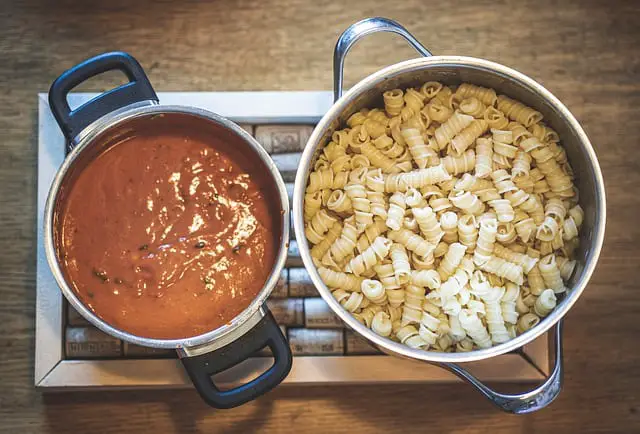To cover or not to cover your tomato sauce while cooking? I have found out many opinions on this. In case you want to know what way works best? Here is what I have found.
Tomato sauce that is going to be reduced (thickened) should be simmered uncovered. You can start by covering sauce with lid until it has started to boil. Then reduce heat and bring sauce to a simmer. Finish sauce uncovered until desired consistency.
Cooking tomato sauce usually only requires it to be heated. That is the basic and easiest way to get it done. Store bought sauce especially. Most sauces you will find turn out great that way.
When you want to try something different, or see if you can change the taste of a sauce. Cooking it can be a fun experiment.
Do Sauces Thicken With Lid On or Off?
What if the sauce you are going to use is more watery then you would like? You will need to thicken the sauce by reducing the liquid. Thickening sauce is called reducing.
The most common way to reduce tomato sauce is to heat and boil away the water. Sauces will thicken more effectively with the pan lid off. Having lid on will trap the evaporated water.
This water usually collects onto the lid and then drips back into the sauce. Even if you continue to stir sauce, only when you lift the lid will moisture escape.
Sauces definitely thicken much faster when the lid is off the pan. Trying to reduce a sauce with the lid could lead to other problems.
As the water rising to the top of the sauce. It will begin to separate, leaving a thickened sauce on the bottom. Which could start to overcook if not stirred.
Simmering is less than a boil and for sauce its a effective way to slowly reduce it and bring out the flavor.
When simmering you want to avoid too much heat. Leaving the lid on will also trap heat, causing the simmer to turn to a harder boil. That is another reason to leave your lid off while simmering.
Visit my post about other ways to thicken tomato sauce.
Cooking Tomato Sauce: Reducing and Thickening
How Long Should I Simmer Tomato Sauce?
You may find many different answers to this question. Again if you have store bought tomato sauce, you shouldn’t have to simmer it at all. Just bring it up to heat.
There are generally variations on how long you should simmer tomato sauce. Since it really depends on what you think is good, but…
Here is the general range of cooking time. Anywhere from 1 hour up to 6 hours of simmer. That is slow simmering of your tomato sauce.
You can always add more water to the sauce as you simmer it. To allow the tomatoes to cook longer but not start to burn.
If you are unsure you can always go by taste. Try your sauce as you cook it to see if you think it needs to go longer.
Besides simmering, to go for a fresh tomato taste cook with high heat for a short period of time.
The longer you cook the sauce the more sweet the it will turn out (up to a certain point). This is where simmering for long periods of time come in.
Also if you have a meat sauce, you should simmer for longer periods of time. Between 2 to 4 hours.
Some people will say that after 4 hours there isn’t much flavor to gain. That essentially it doesn’t do much more to flavor.
Then there are always stories of people’s mother or grandmother cooking tomato sauce for days.
I would shoot for simmering your tomato sauce for 2 – 3 hours. Sample it as you go and remember how long you did it for. You will find out a perfect time for your particular recipe.
Does Sauce Thicken on High or Low Heat?
Sauce will thicken the fastest with high heat. Both low and high heat can be used to reduce a sauce.
Here are some things to remember:
When you turn off the heat, the pan remains warm and can continue to thicken a sauce. Pull off your pan or turn heat down earlier and adjust for cooling time.
High heat takes less time but that also means its easier to mess up the sauce. If you are not careful the sauce can become scorched quickly. Then it will have a burnt taste.
How Do You Stop Tomato Sauce From Splattering?
One of the biggest fears is the splattering of tomato sauce when boiling. Because of the very bad mess and stains it could make. Also the cleanup is not fun, so let’s try and avoid that.
You can really stop tomato sauce form splattering, it will probably happen. Luckily you can prevent the splattering from getting out of hand.
The best way is to simmer the sauce, not only is simmering the sauce a good way to thicken and cook it. Simmering will prevent major splattering. Since its a very gentle boil.
Another reason to cover sauce in the beginning. Until it begins to boil, then reduce heat and wait until it is simmering.
If you still are worried about splattering. Maybe you don’t trust yourself or someone else cooking the tomato sauce. You can use a splatter screen on top of the pan.
Splatter guards are a metal mesh cover that you place on top of pans. They screen out the splatters while letting heat and steam escape. Splatter screens come in a variety of different sizes, most are always round in shape.
Lay the spatter screen on top of your pan during the cooking. I would still avoid bringing any tomato sauce to a high boil.
Another great way to reduce sauce quickly. Without causing a huge mess. Is to use a wide and deep pan. A wide pan allows for all the liquid to evaporate faster. The high walls should stop most of the splattering from escaping.
Can You Overcook Tomato Sauce?
Tomato sauce can be overcooked and will taste burnt. You can overcook tomato sauce by continously cooking after most of the water has evaporated.
After the liquid is gone the sauce will begin to stick to the pan. Then it can easily begin to burn.
Besides burning the sauce from overcooking. You may not like a sauce that has been cooked down for several hours. Tomato flavor does come down to a fine balance between acidity and bitterness.
Sometimes the sauce can take on a harsh, bitterness after cooking for too long.

